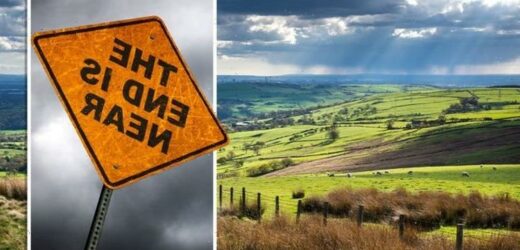Global warming: Expert warns in 2019 that sea levels could rise
We use your sign-up to provide content in ways you’ve consented to and to improve our understanding of you. This may include adverts from us and 3rd parties based on our understanding. You can unsubscribe at any time. More info
Researchers fear a mix of climate change, extreme weather and population growth could help push civilisation to the brink of collapse “in the coming years and decades.”A new study by the Global Sustainability Institute at Anglia Ruskin University (ARU) has examined how such a collapse could disrupt global supply chains, diplomatic agreements and financial structures. The good news is though, the UK and Ireland are well suited to weather the storm.
The research was published on July 28 in the journal Sustainability and listed the five countries “best suited” to survive civilisation’s collapse.
Professor Aled Jones, Director of the Global Sustainability Institute at Anglia Ruskin University (ARU), said: “Significant changes are possible in the coming years and decades.
“The impact of climate change, including increased frequency and intensity of drought and flooding, extreme temperatures, and greater population movement, could dictate the severity of these changes.”
The study’s authors looked at how a number of factors such as the destruction of the environment, limited access to resources and population growth could lead to a breakdown of complex civilisation.


Climate change was then factored in as a “risk multiplier”, believing it will further exacerbate the worrying trends.
According to the study, New Zealand topped the list of countries most likely to maintain a grip on civilisation within its borders.
The country was followed by Australia’s Tasmania, Ireland, Iceland and the UK.
Although hypothetical, the collapse of civilisation could be a drawn-out process unfolding over a “long descent” of years or decades.
But the researchers have warned it could as well happen very rapidly – over the course of a year or less – and without prior warning.

A third scenario has also emerged, where the collapse begins gradually before building up catastrophic momentum.
The researchers identified a number of “feedback loops” that could lead to a sudden collapse.
The problems could spread like wildfire from nation to nation due to the “hyper-connectivity” of the financial world.
So what makes the UK and the other four nations “best suited” to survive civilisation’s collapse?


The researchers considered the countries’ self-sufficiency in terms of energy and manufacturing, as well as the availability of arable land against the overall population.
Another key factor is isolation – the distance from other large, populated hubs that could be catalysts for the collapse.
New Zealand, Australia (Tasmania), the UK, Ireland and Iceland are all island nations with favourable climatic influences.
Even with the threat of climate change, the researchers predict the countries will maintain relatively stable conditions.
Of the five nations, New Zealand was found to have the best potential for surviving civilisation’s collapse thanks to its access to geothermal and hydroelectric energy.
The country’s low population – 4.8 million people in 2020 – and bountiful agricultural land added to the assessment.
The UK’s chancess of success are not as clear-cut, however.
The country has a much higher population density and despite boasting fertile soil, its agricultural output is not as solid.
Professor Jones said: “As well as demonstrating which countries we believe are best suited to managing such a collapse – which undoubtedly would be a profound, life-altering experience – our study aims to highlight actions to address the interlinked factors of climate change, agricultural capacity, domestic energy, manufacturing capacity, and the over-reliance on complexity, are necessary to improve the resilience of nations that do not have the most favourable starting conditions.”
Source: Read Full Article


